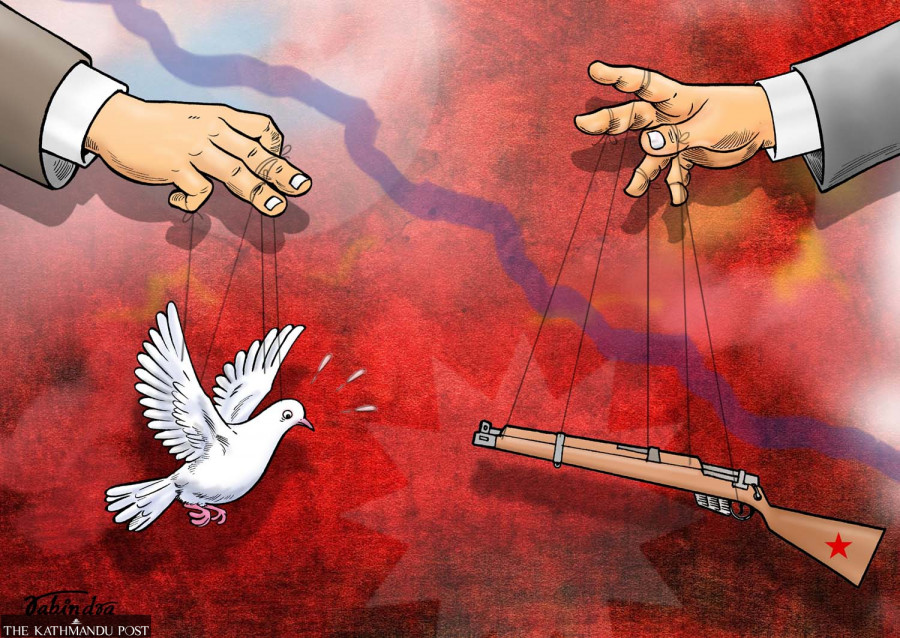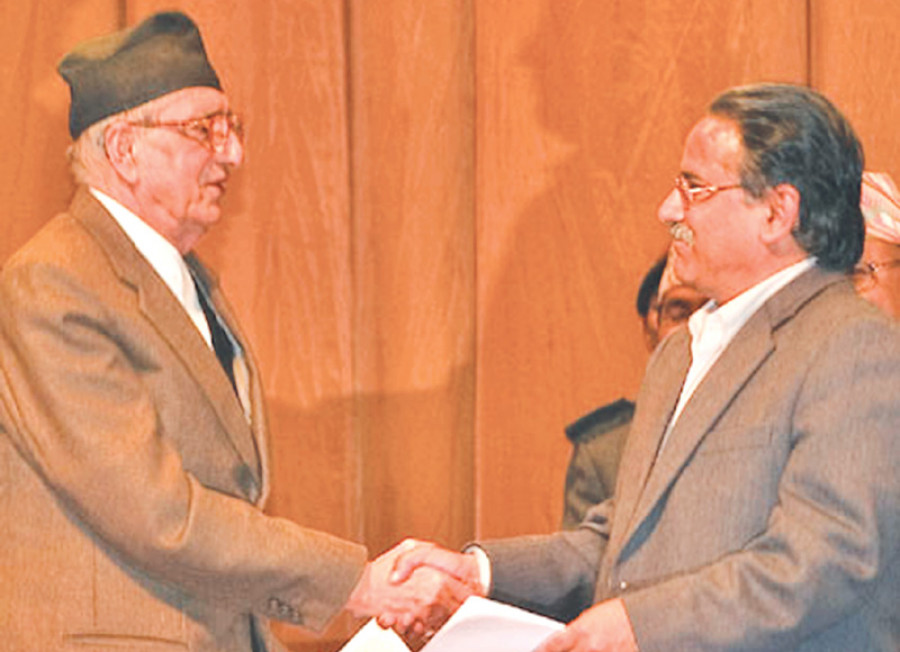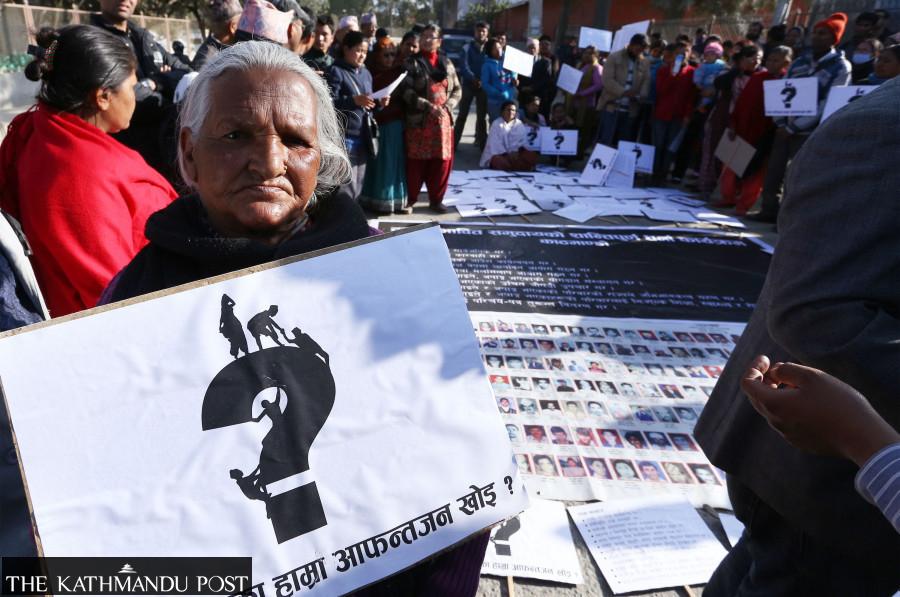
Kathmandu The government is pushing the bill to amend the Enforced Disappearances Enquiry, Truth and Reconciliation Commission Act in Parliament after the Supreme Court decided to register writ petitions against Prime Minister and CPN (Maoist Centre) Chairperson Pushpa Kamal Dahal. The petitions hold him responsible for war-time atrocities, including killings. Like the previous one, the present bill too has met with strong criticism for various reasons including the provisions to shield the perpetrators. Lack of a proper law is among several reasons obstructing the transitional justice process, one of the major components of the peace process that brought the Maoists into mainstream politics.
When did the peace process start?
The signing of the Comprehensive Peace Agreement on November 21, 2006 marked the beginning of the peace process. Then prime minister Girija Prasad Koirala and Dahal, as chairperson of the CPN (Maoist), signed the peace deal that started the party’s journey into peaceful politics. Broadly, the peace process had three goals: integration of the Maoist combatants into security forces, socio-economic transformation of the country through the promulgation of a new charter by an elected Constituent Assembly, and justice for victims of the atrocities from the state security forces and then rebels.

The integration process was completed in August 2013 after 1,460 Maoist fighters, of the 19,600 in total, were integrated into the Nepal Army. The Constituent Assembly promulgated the constitution in September 2015. The third task relating to justice delivery to the victims, however, remains incomplete.
Peace accord and transitional justice
The agreement explicitly stipulated that both sides—the state and the Maoists—would make public, within 60 days of the accord’s signing, information about the real names, castes, and addresses of those who disappeared or were killed during the war, and would inform their family members. However, close to 17 years since the accord’s signing, no party has abided by its commitment. The agreement had also set a target of setting up the transitional justice mechanism within six months.
Transitional justice bodies
There was no initiative to set up the transitional justice commissions even six years after the peace deal was signed. Following constant pressure from the media and the civil society, the government in 2012 issued an ordinance on Truth, Reconciliation and Disappearances with a target to set up one commission. The ordinance landed in controversy and was later repealed. Then, in 2014, the Enforced Disappeared Enquiry, Truth and Reconciliation Commission Act was promulgated envisioning two mechanisms. Accordingly, the Truth and Reconciliation Commission and the Commission of Investigation on Enforced Disappeared Persons were set up in February 2015. Two weeks later, a landmark Supreme Court verdict struck down around a dozen amnesty provisions in the Act, directing the government to amend it in line with the international standards and practices. It asked for the categorisation of violence as serious and non serious and amnestiable and non-amnestiable depending on their severity.
However, instead of following the directive, the Sushil Koirala government moved the Supreme Court, demanding a reconsideration of its decision. It took no initiative to amend the Act. Successive governments did the same. Only in June 2018 did the then KP Sharma Oli government make public the draft amendment bill. The bill was never registered in the Parliament following widespread controversy.
It was only on July 15 last year that an amendment bill to the Act was registered in the Parliament. While it had some progressive provisions like reparation for the rights of victims, it left room open for near blanket amnesty. It didn’t list murder as a serious rights violation nor did it allow appeal of the Special Court’s verdict in the Supreme Court.
The victims of the decade-long insurgency, domestic and international human rights organisations and human rights defenders objected to the bill. They demanded it be revised before being tabled in the Parliament. The then main opposition, CPN-UML, also said it would object to the bill unless murder is listed as a serious violation of human rights. Following the controversy, the Sher Bahadur Deuba government refrained from tabling the bill for parliamentary endorsement even though it had the votes to do so.
What about the new bill?
The government on March 9 registered a new bill in the lower House, which incorporates the same controversial provisions as the previous bill. Except for allowing for an appeal of the Special Court’s verdict in the apex court and increasing the statute of limitations to file cases from six months to a year, all other provisions remain the same.
The bill has listed ‘cruel murder’ or murder after torture, rape, enforced disappearances and inhumane and cruel torture as a serious rights violation. But ‘murder’ is just a human rights violation, therefore amnestiable. “During discussions last year, government representatives committed to removing the provisions that shield perpetrators,” Janak Raut, a former general secretary of the Conflict Victims Common Platform, told the Post. “It is now clear that they were lying.”
What will happen to the bill?
The government is preparing to present the bill in the lower House on Sunday. The lawmakers will then be allowed to comment on it and be given 72 hours to submit an amendment, if any. It will then be sent to the Human Rights Committee of the parliament if felt necessary. The House committee will resolve differences among lawmakers before the final bill is tabled for the endorsement in both the Houses.
Can victims’ concerns still be addressed?
Yes. The lawmakers can register amendments of the bill’s controversial provisions. “The House has every authority to correct the flawed provisions in the bill. If parties are sincere, they can do it,” Dinesh Tripathi, a constitutional and human rights lawyer, told the Post. “Everyone must understand that the present bill cannot ensure justice to the victims.”

He says the legitimacy of the transitional justice process will come under question if the victims and the human rights community are not satisfied. As human rights issues are not confined to the country’s boundaries, the victims always reserve the right to internationalise their case so long as they feel justice hasn’t been delivered.
What if the bill’s endorsed as it is?
Conflict victims say they will reject the transitional justice process that is pushed without having a proper law. They have been demanding revisions in the provisions that are targeted at stopping prosecution against the perpetrators. “Once the flawed provisions are corrected, the chairpersons and members [of the transitional justice bodies] should be appointed through a transparent selection process. The process must be consultative,” said Raut, the conflict victims’ representative. “We want people with high integrity who don’t get dictated by the political parties to lead the two commissions.”
Legal experts and human rights defenders say that if the flawed legal provisions are endorsed, the victims will start seeking justice through the regular judicial process and, in fact, some of them have already done so. Charan Prasai, a human rights defender, said more and more victims will start filing cases with the police or seek the court’s intervention if the authorities don’t help them.
The writ petition against Dahal is one such case. The families of the victims of enforced disappearances have started approaching the local police to lodge cases against the perpetrators. Where the police have refused, they have moved the court seeking orders to lodge such cases. Only last month, the Pokhara High Court directed Myagdi Police to receive complaints in the case of enforced disappearances. “Also, such cases can always be internationalised if the victims are deprived of justice,” Prasai said.












